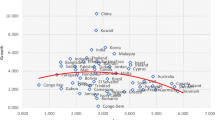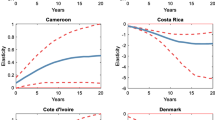Abstract
One may analyse interaction effects either by adding a multiplicative term to an ordinary regression equation or by group comparisons. The effects of human capital formation and government revenues on economic growth in LDCs serve as an example. The proposition under discussion claims that high government revenues (as a share of GDP) cancel the otherwise positive effects of human capital formation on economic growth. This proposition cannot be supported in regression analyses with an interaction term, although it receives rather strong support from comparisons of linear-additive regressions of growth of rates on human capital formation separately done for high and low revenue countries. This result leads to the question which technique and thereby which finding should be adopted. Since regression analyses with interaction terms investigate, whether an interaction of a restricted, symmetrical type applies, group comparisons should often be preferred.
Similar content being viewed by others
References
Allison, Paul D. (1977). “Testing for Interaction in Multiple Regression”. American Journal of Sociology 83: 144–153.
Ballmer-Cao, Thanh-Huyen and Scheidegger, Juerg (1979). Compendium of Data for World-System Analysis. Zuerich: Soziologisches Institut der Universitaet.
Bernholz, Peter (1982). “Expanding Welfare State, Democracy and Free Market Economy: Are They Compatible?” Zeitschrift fuer die gesamte Staatswissenschaft 138: 583–598.
Bernholz, Peter (1986). “Growth of Government, Economic Growth and Individual Freedom”, Journal of Institutional and Theoretical Economics 142: 661–683.
Bornschier, Volker (1980). Multinationale Konzerne, Wirtschaftspolitik und nationale Entwicklung im Weltsystem. Frankfurt/Main: Campus.
Bornschier, Volker, Chase-Dunn, Christopher, and Rubinson, Richard (1978). “Cross-National Evidence of the Effects of Foreign Investment and Aid on Economic Growth and Inequality”. American Journal of Sociology 84: 651–683.
Friedrich, Robert J. (1982). “The Workshop: In Defense of Multiplicative Terms in Multiple Regression Equations”. American Journal of the Political Science 26: 797–833.
Horvat, Branko (1974). “The Relationship between Rate of Growth and Level of Development”. Journal of Development Studies 10: 382–394.
Jagodzinski, Wolfgang and Weede, Erich (1981). “Testing Curvilinear Propositions by Polynomial Regression with Particular Reference to the Interpretation of Standardized Solutions”. Quality and Quantity 15: 447–463.
Krauss, Melvyn B. (1983). Development Without Aid: Growth, Poverty and Goverment. New York: New Press (McGraw-Hill).
Kuznets, Simon (1976). Modern Economic Growth. 7th edn. New Haven, Conn.: Yale University Press.
Maddison, Angus (1969). Economic Growth in Japan and the USSR. London: George Allen and Unwin.
Marsden, Keith (1983). “Steuern and Wachstum”. Finanzierung und Entwicklung (HWWA-Institut fuer Wirtschaftsforschung, Hamburg), 20 (3): 40–43.
Meyer, John W., and Hannan, Michael T. (eds.) (1979) National Development and the World-System. Educational, Economic, and Political Change, 1950–1970. Chicago: University Press.
Mincer, Jacob (1980). “Human Capital and Earnings”. pp. 103–128 in: A.B. Atkinson (ed.), Wealth, Income and Inequality. London: Oxford University Press.
Robinson, Sherman (1971). “Sources of Growth in Less Developed Countries”, Quarterly Journal of Economics 85: 391–408.
Rosen, S. (1980). “Human Capital: A Survey of Empirical Research”. pp. 129–150 in: A.B. Atkinson (ed.), Wealth, Income and Inequality. London: Oxford University Press.
Rubinson, Richard (1977). “Dependence, Government Revenue, and Economic Growth, 1955–1970”, Studies in Comparative International Development 12: 3–28.
Taylor, Charles and Hudson, Michael C. (1972). World Handbook of Political and Social Indicators. 2nd edn., New Haven, Conn: Yale University Press.
Weede, Erich (1981). “Dependenztheorie und Wirtschaftswachstum”. Koelner Zeitschrift fuer Soziologie und Sozialpsychologie 33: 690–707.
Weede, Erich (1983). “The Impact of Democracy on Economic Growth”, Kyklos 36: 18–36.
Weede, Erich (1984a). “Political Democracy, State Strength and Economic Growth in LDCs”. Review of International Studies 10: 297–312.
Weede, Erich (1984b). “Democracy, Creeping Socialism and Ideological Socialism in Rent-Seeking Societies”. Public Choice 44: 349–366.
Weede, Erich (1985a). Entwicklungslaender in der Weltgesellschaft. Opladen: Westdeutscher Verlag.
Weede, Erich (1985b). “Dilemmas of Social Order: Collective and Positional Goods, Leadership and Political Conflicts”. Sociological Theory 3 (2): 46–57.
Weede, Erich (1986a). “Catch-up, distributional coalitions and government as determinants of economic growth or decline in industrialized democracies”. British Journal of Sociology 37 (2): 194–220.
Weede, Erich (1986b). Konfliktforschung: Einfuehrung und Eeberblick. Opladen: Westdeutscher Verlag.
Weede, Erich, and Tiefenbach, Horst (1981). “Three Dependency Explanations of Economic Growth”. European Journal of Political Research 9: 391–406.
World Bank, 1979, 1980, 1981: World Development Reports(s) 1979, 1980, 1981. London: Oxford University Press.
Author information
Authors and Affiliations
Additional information
I want to thank Wolfgang Jagodzinski for his criticism of an earlier version of this paper, and Thomas Jaeger, Joachim Kummer, and Juergen Schwuchow for their computing assistance. This paper focuses of the technical problems which arise if one wants to analyze interaction effects. Readers who are interested in the substantive problems faced by LDCs are referred to my book “Entwicklungslaender in der Weltgesellschaft” (Weede, 1985a).
Rights and permissions
About this article
Cite this article
Weede, E. Interaction effects in cross-national studies. Qual Quant 21, 361–375 (1987). https://doi.org/10.1007/BF00172563
Issue Date:
DOI: https://doi.org/10.1007/BF00172563




